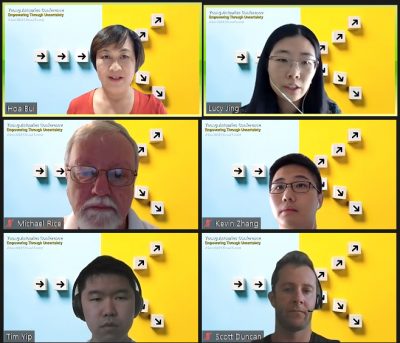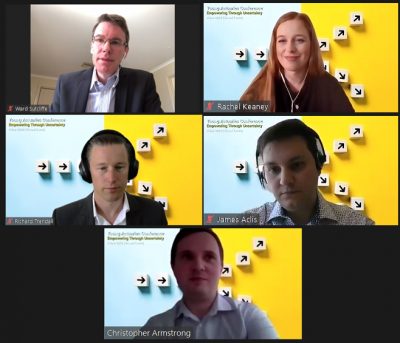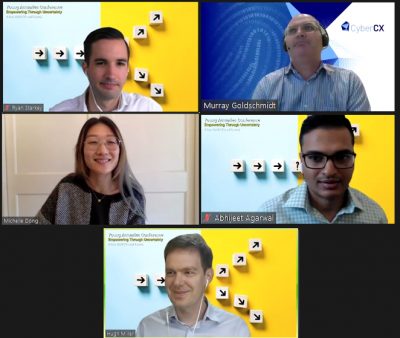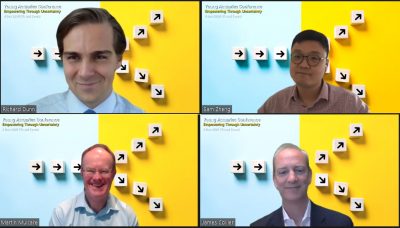
2020 Young Actuaries Conference
The 2020 Young Actuaries Conference (YAC) went virtual for the first time this year, covering the impacts of COVID-19 on the insurance sector, industry developments, emerging opportunities and risks, and the career journeys of three actuaries.
179 young actuaries registered for the Conference this year, including 93 from New South Wales, 28 from Victoria, eight from Queensland, and for the first time, six joining from Asia and beyond. The theme for the YAC was ’Empowering through Uncertainty’, and featured thirteen speakers from various industries who presented across four plenaries:
- A high-level update on COVID-19 impacts on the insurance industry
- The ever-changing industry
- Emerging opportunities and risks for actuaries
- Broadening the horizons of your career
The Conference concluded with an hour of virtual networking, comprising of four 15-minute speed networking groups, enabling attendees to meet other young actuaries across Australia and around the world.
Plenary 1 – A high-level update on COVID-19 impacts on the insurance industry

COVID-19 has had an unprecedented impact on our personal and professional lives. The insurance industry in Australia is not immune, as nearly every business line has been impacted to some degree. Presenters in this plenary shared their insights into how COVID-19 is affecting general insurance, life insurance and retirement incomes, and the uncertainty that remains.
Kevin Zhang, Manager of Life Insurance and Wealth Management at EY, began the plenary with the COVID-19 impacts on Life Insurance. Kevin provided his insights into three areas:
- Mortality impacts
- Morbidity impacts
- Industry responses to COVID-19
Interestingly, Kevin discussed analysis to mid-November that showed there is no significant increase in deaths than a normal year due to COVID-19 except for some spikes in late March to early April and the end of July. However, some of these findings are uncertain due to potential misclassification of deaths due to the limited amount of COVID-19 testing early on. The key longer-term risk for life insurers will be the longer-term economic impacts to morbidity insurance products.
Michael Rice, Executive Director of Rice Warner, then covered the effects on retirement incomes, specifically the impact of the early release of superannuation scheme.
The statistics on withdrawals were quite astonishing with the most impacted funds receiving early release applications from 23-40% of their members who withdrew $1-5 billion per fund. A key takeaway is how significant an achievement this was for the industry. Funds were able to issue refunds within a very short timeframe while successfully managing liquidity and asset allocation.
Finally, Scott Duncan, Principal at Taylor Fry, shared the COVID-19 impacts on general insurance, highlighting the most impacted business lines, domestic motor, travel insurance and business interruption.
The impact on general insurance lines varies but in each case the government, the judiciary, insurers and customers must strike a balance between meeting customer expectations while maintaining insurer stability. Customer expectations are at the forefront of decision making following the Royal Commission. However, a measured approach must be taken to prevent the flood gates opening for claims that were never intended to be covered and have not been funded for through premiums.
Plenary 2 – The ever-changing industry

Starting with Richard Trendall, Valuation Actuary at IAG New Zealand, who provided the lessons and opportunities of working on IFRS 17. Richard highlighted opportunities for young actuaries working on large projects like IFRS 17 and five key actuarial skills that set him up for success:
- Problem solving
- Technical expertise
- Professional judgment
- Adaptability – especially for providing advice in an uncertain environment
- Communication
Rachel Keaney, Director of Pacific Life Re, then shared her experience in improving disability income products to become more sustainable and align with the insurability principle. Actuaries have a role to play across product design, pricing, risk management and experience monitoring. Rachel encouraged the young actuaries to take a role in understanding and managing risk by:
- Staying up to date with industry issues and developments
- Understanding how their role relates to the bigger picture
- Joining industry working groups or supporting colleagues who are already involved
The plenary concluded with Ward Sutcliffe, Acting Senior Regulatory Specialist at Australian Securities and Investments Commission, educating young actuaries on Design and Distribution Obligations which will require issuers and distributors of financial products, including insurers, to take a consumer-centric approach and implement effective product governance arrangements. The intent is to ensure products are designed, targeted and sold to the right customers. ASIC’s regulatory guide on the Design and Distribution Obligations is available on the ASIC website.
Plenary 3 – Emerging opportunities and risks for actuaries

The first presentation focused on data analytics, specifically natural language processing (NLP) and was presented by Andrey Ponomarev, Lead Modelling and Analytics Specialist and Abhijeet Agarawal, Executive Manager.
Andrey explained how NLP models can be created to classify documents, understand customer intent during call centre and chatbot support and extract information from unstructured text. During his presentation, Andrey also debunked three common NLP myths to further convey how NLP works and shared how interested young actuaries can start building their own NLP models.
Cyber risk continues to emerge as a key risk for organisations and individuals. However, this topic is not frequently covered in detail within our profession and especially with young actuaries. Murray Goldschmidt, Executive Director of Cyber Capability, Education and Training at CyberCX, provided a high-level overview of the cyber threat landscape and developing cyber capability.
An insightful comment from Murray was that a resilient eco-system no longer relies on software and hardware alone, it requires a cyber capable workforce who understand the cyber risks and how to mitigate them. Murray also highlighted that the government is likely to classify banking, finance and insurance as critical infrastructure, which will increase the level of cyber security required in these areas.
The final presentation was by Hugh Miller, Principal at Taylor Fry, on how actuaries are becoming involved with the social sector. Hugh started by highlighting how large the social sector is, which spends around $600 billion compared to $120 billion for insurance per year. Hugh shared the following reflections on his actuarial experience in the social sector to date:
- Actuarial work is often highly regarded so involvement is increasing
- Social sector work can suit actuaries because of complex funding arrangements
- Data access can still be challenging
- The importance of always considering the broader policy context, communication, professionalism around the use and appropriateness of models
Plenary 4 – Broadening the horizons of your career

The final plenary was a career focused panel discussion that brought together actuaries who have been through very different experiences. Each speaker was asked a range of questions to explore their journeys and lessons.
Martin Mulcare, non-executive director and skilled adviser and facilitator, was asked what actuaries can learn from volunteering:
- Broadening exposure to industries and different perspectives
- Learning other’s styles by participating on working committees and in activities
- Networking with new actuaries and other professions for career and mentor opportunities
- Enhancing your CV and performance review with demonstratable skills and volunteering
James Collier, Senior Partner at KPMG, highly encouraged young actuaries to find a mentor early in their careers to provide valuable feedback and perspective on how to do things differently. This is not something young actuaries receive when they are at the start of the career and James wished he had a mentor earlier. He also encouraged the audience to find both internal and external mentors for more diverse perspectives.
Sam Zheng, Co-Founder and CEO of Curious Thing, is a successful actuary and data scientist who inspired many young actuaries to take on the start-up challenge. The best piece of advice from Sam was his response to how to start your own business. Sam said to never question whether the idea is financially viable without starting because the answer will always be no. Instead consider whether the product can be sold, who won’t buy it and what are the drivers. Take a jump and get started.
Conclusion
After the plenaries, the inaugural Young Actuaries Advisory Board (YAAB) was announced, which will focus on improving the engagement of young members with the profession. Readers can learn more about YAAB here.

Thank you to all our speakers, Finity Consulting for sponsoring, the Actuaries Institute and the YAC Organising Committee for delivering another successful event.
CPD: Actuaries Institute Members can claim two CPD points for every hour of reading articles on Actuaries Digital.






